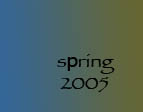


Program Description
Conflict is a fundamental dynamic of human experience and interaction. It is the necessary struggle to balance concern for self with connections to others. Because pain, suffering, and
stress are deeply associated with our perception of conflict,
we tend to regard conflict as a destructive or destablizing force.
Seen from another perspective, however, conflict is one of the most life-affirming forces in nature. Without conflict, children
would not develop into normal human beings. Without conflict, literature and the performing arts would be dull and insignificant. Without conflict, we would live in a rather uneventful and humorless world.
The challenge for all of us and the purpose of this program is to understand and experience conflict as an important, unavoidable, and generally useful life force. In addition to exploring and analyzing conflict from a variety of sources--the arts, current events, the family, and work, to name a few--we will use our study to develop skills for effective conflict management. The program format will include workshops, seminars, lectures, experiential exercises, group, and individual presentations. We will focus on clarity in oral and written communication, critical analysis, and the ability to work across disciplines and significant differences.
The following questions will form the basis of our learning goals:
-
What can literary and dramatic (novels, plays and films) reveal to us about real life conflict?
-
What is the difference between internal vs. external conflict? What strategies are available for resolving/managing conflict?
-
What role does diversity (gender, race, culture, generation, religion, socio-economic status, etc.) play in conflict?
-
What is the role of conflict in personal growth and development? How can "embracing conflict" contribute to one's personal growth and development?
-
Students are expected to fully participate in all aspects of the class, to thoroughly prepare for each class session, and to complete all assignments on time. Late assignments will not be accepted. Attendance is essential. Unexcused absences, late, incomplete or unsatisfactory completion of assignments or plagiarism will constitute grounds for loss of credit.
-
Faculty are expected to be prepared for lectures and class sessions, to provide feedback on written assignments in a timely manner, to be available for consultation by appointment, and to provide a written evaluation of the student's overall work in the program.
-
Attendance and participation in class
-
Thorough reading of assignments and preparation for seminar discussions
-
The amount and quality of your work observed through your use of Web X
-
The quality of ideas and writing in your essays and responses to classmates' essays
-
The research, content, quality of ideas and dramatic presentation in your group term project
Expectations
Evaluations will be based on:
Credit Equivalency
2 credits in psychology of conflict - 2 credits in conflict management - 4 credits in expressive arts
web design: mark harrison
web support: beth stinson